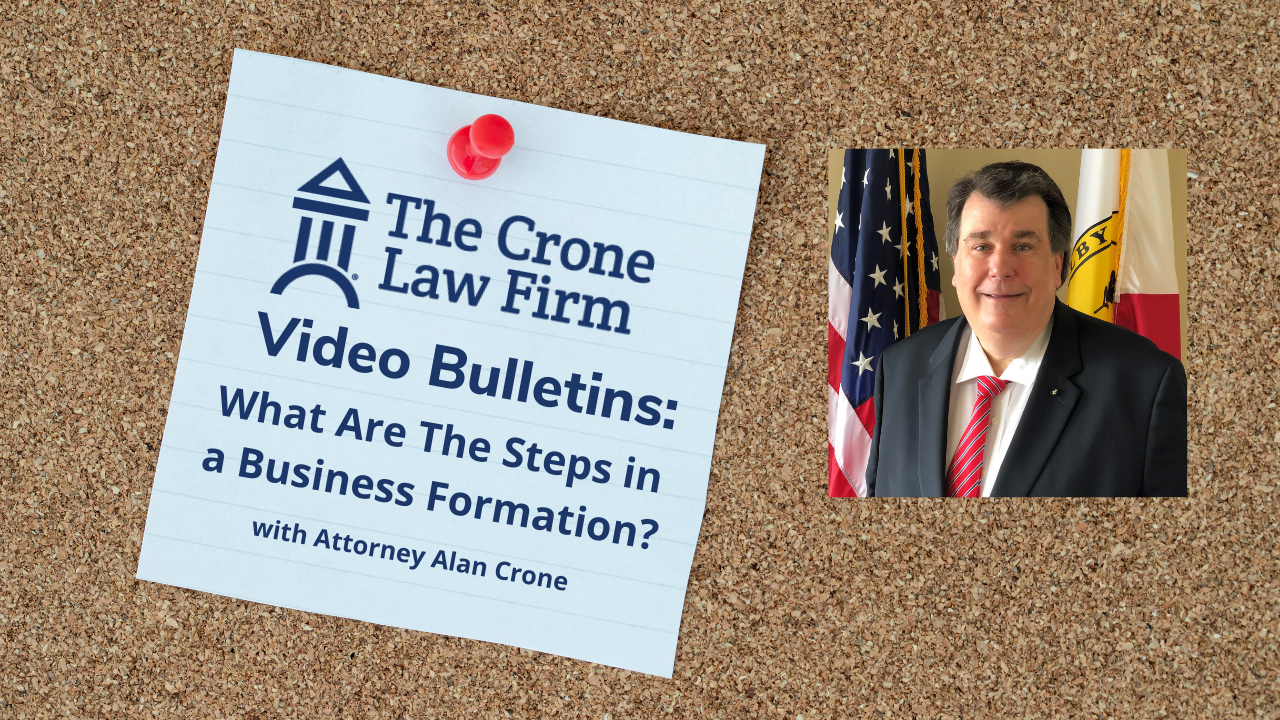We are back with another legal video bulletin! Business lawyer Alan Crone answers, what are the steps in a business formation? We have the bulletin linked below, and a full transcription underneath!
What Are The Steps in a Business Formation?
Hello, everyone. My name is Alan Crone, and I’m the CEO of the Crone Law Firm. And we’re here with another legal bulletin where we answer your questions about the law. And today’s question, what are the steps in a business formation?
I love helping people form businesses. It’s very exciting. But there are definite steps that you want to think about. Now, again, how you form a business has as many variations as there are businesses out there. But let’s talk about some of the steps.
The first step is very basic, and that is, all right, what are you going to do? What’s the business about? Having a clear mission for the business is very, very helpful. Write it down. My mission in the ACME Portable Hole Company is to sell the best portable holes in the Southeast, or my mission at the ACME Portable Holes Company is to make quality portable holes available in the construction industry in the Southeast, whatever it may be. That way, you know what your mission is.
The next consideration for me is going to be, all right, how many people are involved in this? Just one person, single equity share, stockholder, whatever it may be, or are you going to have partners? Are you going to have financing sources? It’s good to have the conversations among all those people early on about what role they all want to have. And do they really want equity? Are they just loaning you money? What is going to be the relationship between all of these people?
Then you want to talk about governance. How is the company going to be run? Who’s going to make the decisions? Are you going to have a board that makes big policy decisions and then executives who implement them? Are you going to manage the business by committee? What are you going to do? I always recommend to everyone that the buck stop somewhere, that someone be in charge. Have the ability to make a decision.
Because if you get to a point where you can’t make decisions, whether it’s what paper clips to buy, whether or not to go into a particular product area, whether to sign a lease, all of those things. You’ve got to know how those decisions are going to be made, or you can find yourself at impasse over those kinds of decisions. So have a frank conversation about that.
The next thing I always advise people to do is to establish relationships with a lawyer, with a banker, with a CPA accountant, a tax person, and a bookkeeping person. That may be the same person. But then you want to talk Okay, how are we going to organize the business? Is the business going to be a sole proprietorship?
In other words, I’m just going to go out and start doing business in my own name or maybe in a DBA, doing business as name. If I’m going to have other partners, we’re going to have a partnership agreement, or we’re going to have a limited liability company, or we’re going to have a corporation.
People ask me frequently, well, what’s the best way to go? It depends on your in a particular situation. If you’ve got a lot of people investing, then you want to have a more formal structure and you want to have a more centralized decision making that’s more removed from all of the various shareholders, empower someone to be the CEO and let them run the company.
If there’s only one or two of you, then you may want to have more of an informal structure. Limited liability companies can be very informal. They can also be formal. Corporations Organizations are much more formal. Then once you’ve decided on that business entity type, then you want to develop governing documents, whether those are partnership agreements, operating agreements in terms of a limited liability company, bylaws in terms of a corporation, shareholder agreements, et cetera.
You want to think about an exit strategy. What happens when you sell to a venture capital firm and everybody’s out? How are you going to do that? What happens if one of the members or shareholders decides to leave and you need to buy that person out or they want to buy you out? You need to have that thought through and you need to have a plan for it on how the company is going to be valued in such a circumstance and what the process for that is going to be.
Those kinds of exits, I call them business divorces, if they’re not planned, can be very expensive. Those are the first steps that you take. Once you get all that done, then you file. If it’s a public entity like a limited liability company or a corporation, you might file that with the Tennessee Secretary of State’s office or your State Secretary of State’s office in the county in which the principal place of business is, you’re going to register an agent. Lots of things that are going to happen after that. And then it just really depends on what your operating situation is.
Those are the steps of business formation. If you’ve got some questions, please give me a call. I’d love to answer your further questions about them. If you’ve enjoyed this bulletin, please share it on social media, email it to a friend or colleague that you think might enjoy it. I’m Alan Crone, and I’m going to go get some justice. Thank you.


